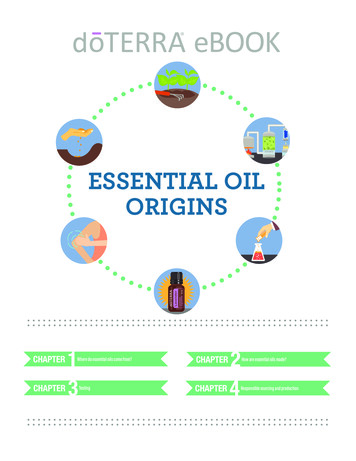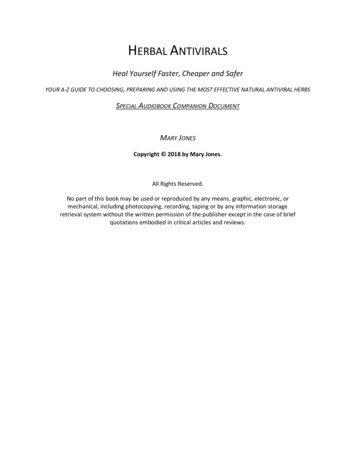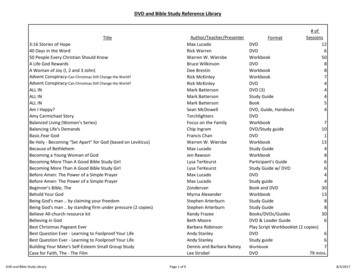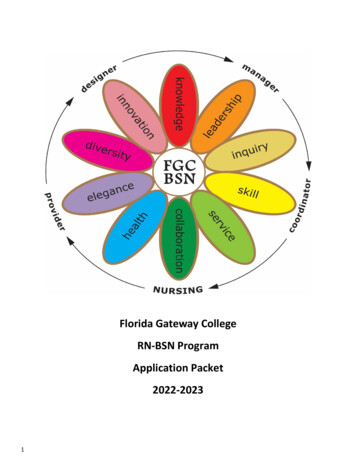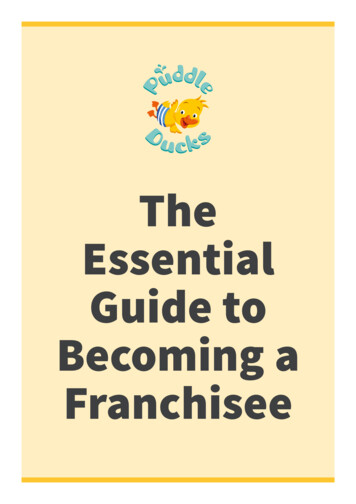
Transcription
TheEssentialGuide toBecoming aFranchisee
Franchising can be a great option for peoplelooking to get into the world of business. Formany, franchising can appear to be an attractiveoption - the freedom and flexibility offeredappeals to many people, ranging from newparents to experienced business execs.This guide looks at the essential information thatthose considering purchasing a franchise needto know - from the basics of franchising rightthrough to signing your agreement and openingyour new business.
ContentsWhat is franchising? 3The basicsPopular franchisesWhat kind of opportunities does franchising offer?Is franchising for you?Pros and ConsCosts involved 7Getting started 8Choosing a franchiseCompleting your researchWhat happens next?Signing the agreementThings to consider 13Site/location selectionThe opening processSupportIs it for you?
What is franchising?In this section, we look at the basics of franchising, the opportunitiesit can offer, both the pros and cons of opening a franchise and whetherfranchising is an option you should consider.The basicsFranchising is the granting of a license by one person(the franchisor) to another (the franchisee), entitling themto own and operate their own business under the brand,systems and proven business model of the franchisor.The franchisor also offers support and mentoring. Inreturn, the franchisee will provide a specific product orservice to an agreed standard set by the franchisor.Popular franchisesMost of us may regularly visit or use popular franchisebusinesses without even realising. These include:- Subway- Supercuts- CeX- Cash Converters- SportsXtra- Boots Opticians3
What kind of opportunities does franchising offer?Opening a franchise can provide opportunities toboth seasoned business people and to those with littleexperience of the corporate world due to full trainingbeing provided by the franchisor.Franchising is often a lower risk option than startinga business from scratch, as many franchises possessbrand recognition that would take years for a start upto establish. With this comes consumer trust.As well as this, many people are attracted to theopportunity to be their own boss, work hours that suitthem, have control over their business decisions anddirect input into all aspects of their business. Withfranchising, you have both independence and stability.Is franchising for you?Franchising is a brilliant business opportunity, but it’snot the right decision for everyone. To be a successfulfranchisee, you need to know that you are the type ofperson who can:Take on the responsibilities of runningyour own business.Adequately run a business to the franchisor’s requirementsand standards while following specific guidelines.Interact well with lots of different people; your franchisor,other franchisees, your employees and your customers.Carefully consider and understand legaldocuments that you will be required to sign.4
Pros and ConsThere are many positives to starting a franchise, but aseverything else in business, it is not completely withoutrisk.ProsBrand awareness - potential customers may alreadyknow about your brand and the services/products youoffer before you even start.Operating system - with a franchise, you have access to acomplete, established business, including supplies, parts,products and manuals.Contacts - when you begin a franchise you will have accessto contacts in the industry that can help with supplying,marketing and recruitment.Marketing - marketing is one of the biggest benefitsfranchising can offer. Instead of planning and creating yourown campaigns from scratch, you will instead only have toconcentrate on using and tailoring what is provided by thefranchisor to meet your local needs.Support - franchisors provide franchisees with extensivetraining in many areas of new business. Some franchisorscan also provide field support specialists to help keep theirfranchisees on track, training them to become managersand leaders.5
ConsLack of autonomy - when you open a franchise, yousign an agreement to follow the rules laid out by thefranchisor. If you are particularly creative or like to havecomplete control, you may struggle with this.Ownership - when you decide to open a franchise, youwon’t actually own the franchise unit. You will be awardeda license to use the franchisor’s brand name, operatingsystem, equipment and uniforms.Reputation - if the brand is called into disrepute throughno fault of your own, this might affect the reputation of yourbusiness. Any failure of the franchisor has a knock on effectthat affects the whole franchise network.6
Costs involvedThe costs involved in setting up a franchise will depend on the typeof franchise you choose and the way they operate. The franchiseeusually pays a one-time franchise fee, plus a percentage of salesrevenue as royalty.The price of this will completely depend on the type offranchise, what they will provide you with and how longthey have been franchising, among other aspects. Eachpotential franchisee will be given a breakdown of costsbefore they sign.The cost will always include training but could includevehicles, premises, equipment etc. You may also needworking capital to see you through the set up: somefranchisors insist on this.The cost of a franchise can vary wildly from under 1,000 toalmost half a million pounds! The price of a franchise willusually reflect its earning potential, gravitas of the brand andwhat the franchise agreement contains (e.g. property).7
Getting startedAfter considering both the pros and cons, here are some furtherareas of consideration before finally deciding if franchising is for you.Choosing a franchiseThere are many different ways to find out about thefranchises that are available to you. The British FranchiseAssociation (bfa) provides details of members who areoffering new franchise opportunities, as well as offeringguidance and seminars on franchising.The bfa are the voice of ethical franchising in the UK, theTrade Association for those who pass accreditation andeducator to the many potential individuals and businessesthat consider franchising.It’s important, when choosing a franchise, to considerthe type of work you enjoy; if you’re passionate, you’re farmore likely to work hard and succeed. Remember, startinga franchise is not something you can step out of easily ensure that you research well and choose wisely.8
You also need to ask yourself where you want to work,whether that’s a shop, food outlet, classroom, at homeor something different. This will have a big impact on thetype of franchise you choose.New mothers who prefer to work from home in thedaytime are suited to franchises like leading swim schoolPuddle Ducks, where to start with they will be on theground, teaching classes while the admin/management of the business can be completed at home.Once the business grows to a certain size, office rental isusually the next step.Completing your researchOnce you have a franchise in mind, you should conductfurther research to ensure the brand is the correct choicefor you.Look for:Customer reviews onlineHistorical news stories about the brand,good or badInformation on the competitionInformation on the company’s performanceover the past five yearsA current franchisee you can speakto about their experiences.9
What happens next?Once you have done your research, it’s time to approachyour chosen potential franchisor(s). The first point ofcontact is usually through an online form or phone callin which they will ask you questions about your currentsituation and what area/location you are interested in.Most franchisors will have a prospectus they can sendyou and probably an initial application form for you toreturn to them stating your interest. It is then usual forthem to hold a Discovery Day which a number of potentialfranchisees might attend.Here, the franchisor will tell you about the opportunityand give you the opportunity to ask any questions youhave at this stage.You may then be asked to come in for an interview/to present your business plan based on a template thatthe franchisor will have provided. You should prepareanswers for the following questions:What are your goals?Do you have any experience in this industry?How do you expect to build a customer base?How will you finance this?Do you have experience in management and leadership?Why have you chosen us?Do you have an exit strategy?10
This is also a chance for you to voice your questions andconcerns, and learn everything you need to know aboutyour possible franchise. You should ask questions like:How much money does your average franchisee make?Can I achieve my set goals with your business?Do you help with financing?Do you offer any financial incentives or deals?Do our values and culture align?Describe your training program.How do your royalties and marketing fees work?Don’t forget, you are interviewing your franchisor as muchas they are interviewing you. Try and cover all your basesand don’t be afraid to ask too many questions.Signing the agreementOnce you’ve done your research, assessed the situationthoroughly, and both you and the franchisor are happy toproceed; it’s time to sign your franchise agreement.The franchise agreement is a legal document betweenthe franchisor and the franchisee. It’s a legally bindingand will explain how the franchisor expects you tooperate the business. There is no standard agreement asit will depend on the nature of the business and what thefranchisee expects from you.Though each contract will be different, there are setprovisions that should be outlined in each one:11
Location/territoryHow you should be expected to run your operationsTraining and ongoing supportDuration of licenseBrandingMarketing informationFeesRoyaltiesCancellation and renewal policiesExit strategiesEnsure you read your franchising agreement thoroughly,and you may want to have a franchise attorney review it onyour behalf prior to signing. Some franchisors will insist onthis to ensure both parties are 100% about the contract theyare entering into.12
Things to considerSite/location selectionFranchise territories are usually sold based on an area thatcontains a certain amount of the brand’s target audience;enough to ensure that the business is viable in every case.This means that some territories might be larger than othersif they are in more rural, sparsely populated areas. Youshould consider this in relation to where you live and howyou will service/market to the area you are looking to buy.Once you have decided on a territory, finding the rightlocation(s) within that area to sell your services/productsfrom is also very important. As an example, when a PuddleDucks franchisee looks to hire a pool, they need to consider,amongst other things, how far the pool is from the nearesttown, if the area is popular with young families or if thereare any competitors working close by.Tip - Asking current franchisees about theirsite selection process is a great way to understandwhat you need to consider.The opening processOnce you have decided on a site and sorted out the legal andlicensing issues, it’s time to get your franchise open! Begin bygetting your name out there in the local community. Meet withlocal businesses to form mutually beneficial relationshipsby joining in with local community activities and seeking outlocal networking groups.13
Social media is also your friend at this time. Offer anincentive to new customers, such as a discount on their firstpurchase and promote the deal across all relevant socialchannels. Contact local influencers to see if they are interestedin your business and are willing to give you a shout out.Your first day of opening will be both exciting and scaryat the same time. Ensure you have prepared all you canto offer the best service possible, but bear in mind thingsmight not always go to plan!SupportDuring your first few weeks, it’s OK to lean on your franchisorfor support - also, remember to try not to feel overwhelmed.You should receive support from your franchisor - after all, itis in their best interests that you succeed. A good franchisorwill be able to provide guidance in areas of operating systems,financial management, marketing and any technical aspectsrequired to run the business.Your franchisor will have been in a very similar position to youbefore. They have the experience and knowledge needed tohelp you through your opening weeks, so don’t be afraid toask for guidance.Don’t forget, your franchisor will have been in a very similarposition to you before, so they will have the experience andknow how to help you out.14
Is it for you?Do you think you have what it takes to start a franchise? Ittakes dedication, hard work and patience, but can be anamazing opportunity for the right kind of person.Here at Puddle Ducks, we would love to have you join ourgrowing franchise family and can offer some brilliant benefits,such as:Comprehensive trainingA tried and tested business modelA supportive networkFlexible workingContinued growthCheck out how you can become a franchisee forPuddle Ducks here, or give us a call on 01477 410085.15
The costs involved in setting up a franchise will depend on the type of franchise you choose and the way they operate. The franchisee usually pays a one-time franchise fee, plus a percentage of sales revenue as royalty. The price of this will completely depend on the type of franchise, what they will provide you with and how long




